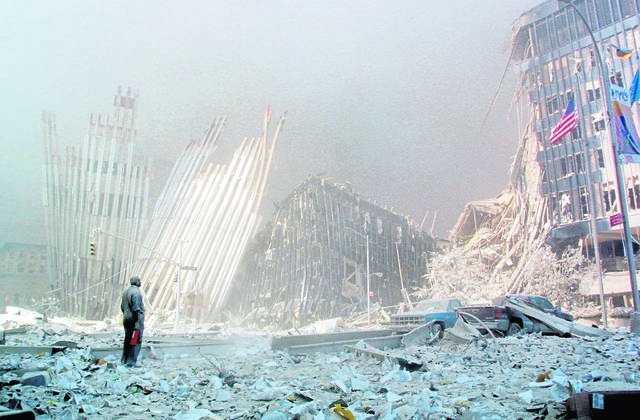https://development.triblive.com/opinion/lori-falce-the-people-we-were-on-9-11/
Lori Falce: The people we were on 9/11

Why aren’t we the people we were 19 years ago?
On Sept. 11, 2001, we were broken and bleeding, grieving and groaning in pain. The terrorist attacks that brought down the World Trade Center and shredded the Pentagon and cratered a field in Shanksville stole thousands of lives and left an entire nation raw.
In our pain, we were like the people blanketed in the ashy dust from the collapsed Twin Towers. On that day, who we were underneath was covered up. There was no red or blue, no left or right. We reached out for hands of different faiths and different colors.
No one looked into the arrest records of victims to suggest they deserved what they got. No one Googled the police officers or firefighters who responded to question their commitment.
It isn’t that our differences went away. It isn’t that there weren’t still people who prioritized fiscal responsibility over domestic policy. There were those who still wanted to address education or healthcare or tax reform or immigration. We were still different people with different priorities and different prejudices.
But for the first time in decades and the only time since, we were able to drown out the background noise with the keening of our communal emotions.
So why does the loss have to be so profound to put our differences aside?
It isn’t that we haven’t felt deep, mortal pain in the ensuing years. Massacred first-graders in Sandy Hook. Bullet-sprayed music fans in Las Vegas. Worshippers at the Tree of Life synagogue in Squirrel Hill. The hurricanes that drowned New Orleans and Texas and Puerto Rico. Tornadoes that leveled towns and fires that burned states.
We lose close to 20 times the people in a year from the opioid epidemic than we did on 9/11. From March 28 to Aug. 22, we have lost more people every week to the coronavirus than we did on that terrible day.
And yet all of those losses — despite marrow-deep pain and soul-felt pleas to come together — have only left us more deeply entrenched in our camps.
How were we able to find our best selves on our worst day? Why can’t the horrific costs of our most pressing problems bring us to that same place?
Because we no longer reach for comfort and compassion. We don’t seek the steadiness of a hand to help us rise. We don’t look for answers or assistance.
Instead, tragedy pushes us past sorrow to anger, and it makes us call less for relief than for retribution. Today our worst days make us look for opponents, as if we can fight our way out of a storm or a disease. We can’t.
Every year, Sept. 11 rolls around again, and every year it is marked by memorials and documentaries. We rewatch the videos and remember where we were when the first plane hit, when the first tower fell, when that Pennsylvania field filled with fire. We recall everything but without learning anything.
The anniversary of the attacks is an opportunity for us to reach back and try to do what we did on that day. To care less about our politics and more about people. To tackle the problem without worrying about who gets credit for solving it. To come together instead of pushing each other away.
It doesn’t look like we will achieve that this year, amid pandemic and election and division.
But every year, we get another chance to be the people we were that day.
Copyright ©2026— Trib Total Media, LLC (TribLIVE.com)
